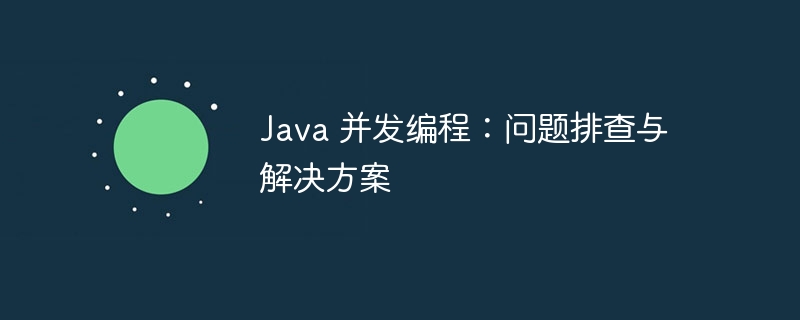Java Concurrent Programming: Troubleshooting and Solutions
Common concurrency problems in Java concurrent programming include deadlock, livelock and memory leaks. The solutions are: avoid multiple locks or use fair locks; use random backoff algorithms or deadlock detection algorithms; regularly use JVM memory analysis tools to detect leak sources. For example, when operating on shared variables in a concurrent environment, locking access using synchronization methods or locks can prevent value inaccuracies caused by competing modifications.

Concurrent Programming in Java: Troubleshooting and Solutions
In Java Concurrent Programming, troubleshooting can be challenging . The following are common concurrency problems and their solutions:
Deadlock
- Problem:Multiple threads are waiting for each other to release the lock at the same time , causing the system to fall into a permanent waiting state.
- Solution: Avoid using multiple locks, or use fair locks to ensure fair access to resources by threads.
Livelock
- Problem:Multiple threads constantly compete with each other for resources, but cannot obtain any resources, causing the system to Stuck in an endless cycle.
- Solution: Use random backoff or deadlock detection algorithm to break the cycle.
Memory leak
- Problem: Objects that have not been used for a long time are still held by threads, causing memory to continue to grow.
- Solution: Regularly use Java Virtual Machine (JVM) memory analysis tools to detect memory leaks and determine the source of the leak.
Practical case:
Consider the following code snippet, in which two threads try to concurrently access a shared variable count:
public class ConcurrentCounter {
private int count = 0;
public void increment() {
++count;
}
public static void main(String[] args) {
ConcurrentCounter counter = new ConcurrentCounter();
Thread thread1 = new Thread(() -> {
for (int i = 0; i < 1000000; i++) {
counter.increment();
}
});
Thread thread2 = new Thread(() -> {
for (int i = 0; i < 1000000; i++) {
counter.increment();
}
});
thread1.start();
thread2.start();
thread1.join();
thread2.join();
System.out.println("Final count: " + counter.count);
}
}When running this code in a concurrent environment, the value of the count variable may be inaccurate due to competing modifications between threads. To solve this problem, you can use synchronization methods or locks to lock access to shared variables:
public class ConcurrentCounter {
private int count = 0;
private final Object lock = new Object();
public void increment() {
synchronized (lock) {
++count;
}
}By using synchronization, we can ensure that only one thread can access the count variable at the same time, thus Prevent competing modifications.
The above is the detailed content of Java Concurrent Programming: Troubleshooting and Solutions. For more information, please follow other related articles on the PHP Chinese website!

Hot AI Tools

Undresser.AI Undress
AI-powered app for creating realistic nude photos

AI Clothes Remover
Online AI tool for removing clothes from photos.

Undress AI Tool
Undress images for free

Clothoff.io
AI clothes remover

AI Hentai Generator
Generate AI Hentai for free.

Hot Article

Hot Tools

Notepad++7.3.1
Easy-to-use and free code editor

SublimeText3 Chinese version
Chinese version, very easy to use

Zend Studio 13.0.1
Powerful PHP integrated development environment

Dreamweaver CS6
Visual web development tools

SublimeText3 Mac version
God-level code editing software (SublimeText3)

Hot Topics
 Square Root in Java
Aug 30, 2024 pm 04:26 PM
Square Root in Java
Aug 30, 2024 pm 04:26 PM
Guide to Square Root in Java. Here we discuss how Square Root works in Java with example and its code implementation respectively.
 Perfect Number in Java
Aug 30, 2024 pm 04:28 PM
Perfect Number in Java
Aug 30, 2024 pm 04:28 PM
Guide to Perfect Number in Java. Here we discuss the Definition, How to check Perfect number in Java?, examples with code implementation.
 Random Number Generator in Java
Aug 30, 2024 pm 04:27 PM
Random Number Generator in Java
Aug 30, 2024 pm 04:27 PM
Guide to Random Number Generator in Java. Here we discuss Functions in Java with examples and two different Generators with ther examples.
 Weka in Java
Aug 30, 2024 pm 04:28 PM
Weka in Java
Aug 30, 2024 pm 04:28 PM
Guide to Weka in Java. Here we discuss the Introduction, how to use weka java, the type of platform, and advantages with examples.
 Armstrong Number in Java
Aug 30, 2024 pm 04:26 PM
Armstrong Number in Java
Aug 30, 2024 pm 04:26 PM
Guide to the Armstrong Number in Java. Here we discuss an introduction to Armstrong's number in java along with some of the code.
 Smith Number in Java
Aug 30, 2024 pm 04:28 PM
Smith Number in Java
Aug 30, 2024 pm 04:28 PM
Guide to Smith Number in Java. Here we discuss the Definition, How to check smith number in Java? example with code implementation.
 Java Spring Interview Questions
Aug 30, 2024 pm 04:29 PM
Java Spring Interview Questions
Aug 30, 2024 pm 04:29 PM
In this article, we have kept the most asked Java Spring Interview Questions with their detailed answers. So that you can crack the interview.
 Break or return from Java 8 stream forEach?
Feb 07, 2025 pm 12:09 PM
Break or return from Java 8 stream forEach?
Feb 07, 2025 pm 12:09 PM
Java 8 introduces the Stream API, providing a powerful and expressive way to process data collections. However, a common question when using Stream is: How to break or return from a forEach operation? Traditional loops allow for early interruption or return, but Stream's forEach method does not directly support this method. This article will explain the reasons and explore alternative methods for implementing premature termination in Stream processing systems. Further reading: Java Stream API improvements Understand Stream forEach The forEach method is a terminal operation that performs one operation on each element in the Stream. Its design intention is






